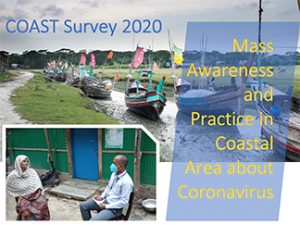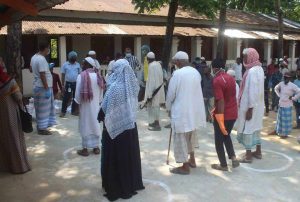This article is part of Reality of Aid – Asia Pacific’s COVID-19 Response Series, “Resisting Repression; Recovering Together”, which aims to document the struggles, best practices, and lessons learned, as well as share recommendations of RoA-AP members as they responded to the pandemic at the national or regional level. Read more stories here.
By Md. Mujibul Haque Munir, COAST Foundation
In March 2020, at the start of the COVID-19 lockdown in Bangladesh, the COAST Foundation reacted swiftly to address the needs of the marginalized and vulnerable communities. Due to the lack of knowledge surrounding the virus, the organization focused on capacitating their own staff through various training sessions, awareness campaigns and monitoring work. Informed by realities on-ground, through surveys and constant interaction with communities, the organization was able to mobilize its resources and provide the appropriate guidance and assistance urgently needed by the people.
Mobilization of financial aid
Instead of running a parallel relief operation in the same jurisdiction, the organization mobilized BDT 1.6 million or approximately USD 18,600 to eight coastal districts and upazila or sub-district administrations, as a donation to the government’s Coronavirus Welfare Fund.
The districts of Bhola, Cox’s Bazar, Chattogram, Feni, Laxmipur, Patuakhali, Barishal, and Jhalakathi, along with 37 coastal upazilas were funded by this donation. The financial aid was distributed equitably to the various districts, with the more vulnerable communities receiving more. The Deputy Commissioners’ Office received BDT 50,000 or USD 580, while the Upazila Nirbahi Officer received BDT 25,000, about USD 290. The Bhola district received BDT 100,000 (USD 1,160), Charfession Upazila received BDT 50,000 (USD 580), and Kutubdia Upazila received BDT 2 lakh or BDT 200,000 (USD 2,300).
Training COAST staff
In 2020, the Monitoring and Research Department conducted a COVID-19 Awareness and Practice Survey. The survey showed that 49% of the responders have no clear idea on the primary protective measures against the virus, while 74% have no knowledge of Bangladesh’s Institute of Epidemiology Disease Control And Research (IEDCR) and its work on COVID-19. To address this, COAST Trust has taken initiative to raise awareness on the virus and the government institutions responsible for handling the pandemic.

At the onset of the pandemic, staff training on COVID-19 was conducted through online courses provided by the World Health Organization (WHO), Bangladesh Rural Advancement Committee (BRAC), and the Government of Bangladesh. Weekly sessions via Zoom were also held to improve staff literacy. COAST’s senior and mid-level staff completed trainings from other organizations, learning platforms and institutions such as BRAC, Jeeon Bangladesh Ltd., Muktopaath, and the WHO.
In addition, COAST organized two virtual online training courses in April 2020, “Prevention of COVID-19” and “COVID-19 and Mental Health”. The first course focused on promoting awareness surrounding COVID-19, including its symptoms and protective measures such as quarantine and isolation. The second course tackled the impact of the pandemic on mental health, and how to cope with stress and pressure. All course materials also remain available on COAST’s website so that other organizations can use these and adapt it to their own contexts.
In May 2020, COAST Trust focused on capacitating the organization on how to take the necessary precautions against the virus, and how to properly share these with the communities. In undertaking the pandemic response, the COAST COVID-19 Preventive Health Rules was prepared, which included the COAST Code of Conduct, revised bio-safety rules and proper orientation to the staff.
Mass awareness campaigns
COAST has been spreading awareness about the pandemic in nine coastal regions since March 2020. The organization posted COVID-19 awareness videos on social media and printed 4.5 lakh or 450,000 leaflets on different topics on the virus, regarding its spread, prevention, and proper care if infected.
The leaflets were distributed to families, schools, colleges, madrasas, and religious institutions in the districts of Bhola, Barishal, Noakhali, Chattogram, Cox’s Bazar, Patuakhali, Jhalakathi, Laxmipur and Feni. These leaflets were especially distributed to 135,700 member-participants of the organization’s microfinance programs. The awareness campaigns were also conducted in vaccination camps in the Bhola district.
For the Rohingya refugees in Bangladesh, 150,000 leaflets in the Burmese language were printed and distributed to households, mosques and market places in the refugee camps. The organization financed this awareness campaign from its Disaster Mitigation Fund.

Humanitarian assistance
After the government announced the countrywide lockdown, the daily wage earners were disproportionately affected as they were the first to be unemployed. The lockdown threatened livelihoods, which prompted food and financial shortages for the host communities of Ukhiya and Teknaf of Cox’s Bazar. These communities lacked the necessary equipment in ensuring their safety against the virus.
To stand with the affected people, COAST provided support to 3,200 families in all unions or local government units of Cox’s Bazar. These families received clean water storage jars with lids, hand soaps and laundry soaps. Additionally, COAST distributed five kilograms of rice to 1,600 families in Ukhiya Upazila.
Sentmartin, a remote island located nine kilometers away from the upazila’s mainland, was also a beneficiary of the organization. An emergency response project was held in the island to distribute essential materials needed by the fisherfolk to address the pandemic.
The rapid and responsive efforts of the COAST Foundation to alleviate the negative impact of the virus in the coastal communities are still ongoing. The organization’s COVID-19 response embodies COAST’s advocacy for a people-centered and rights-based approach to development for the people of Bangladesh.


